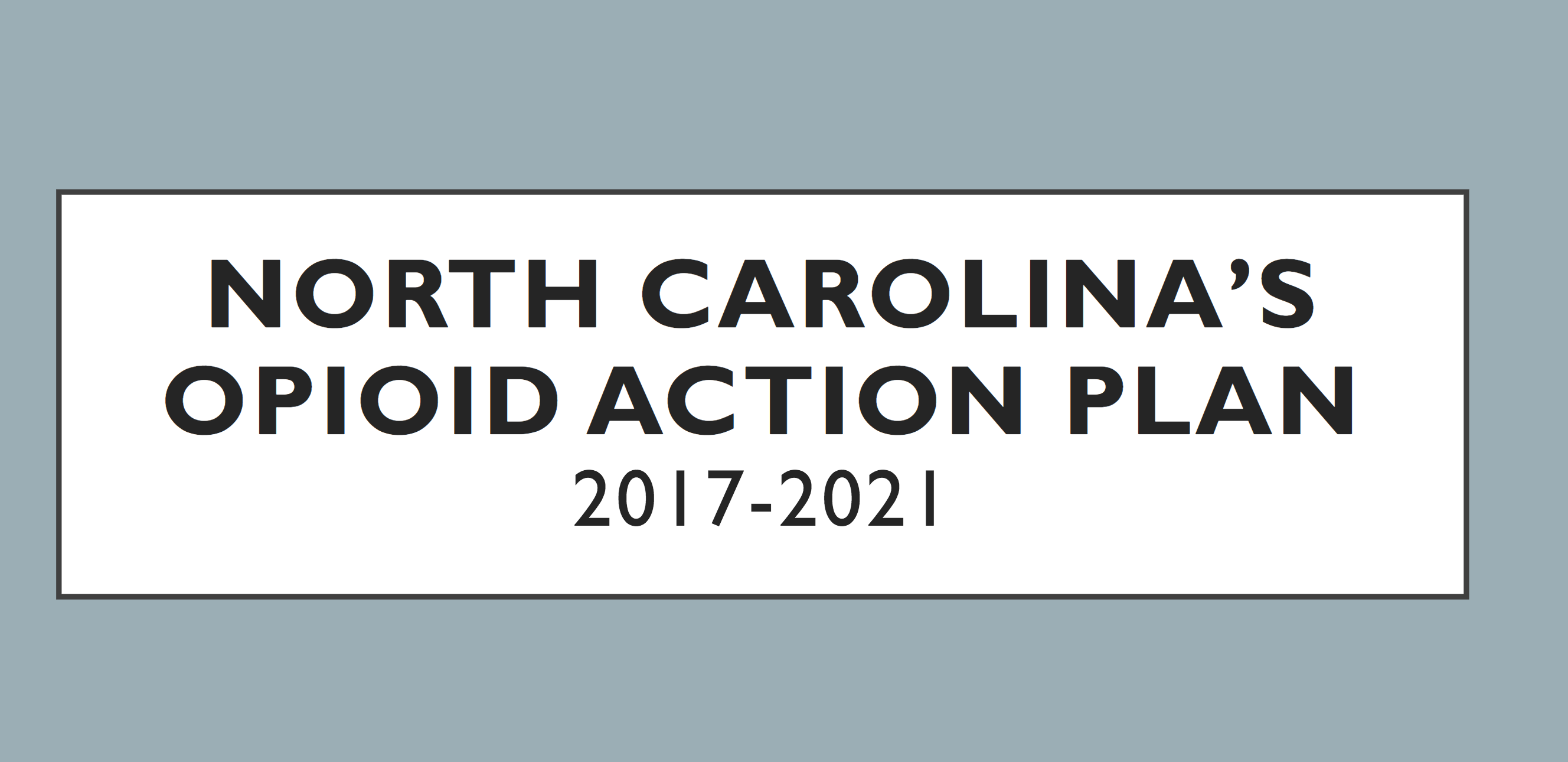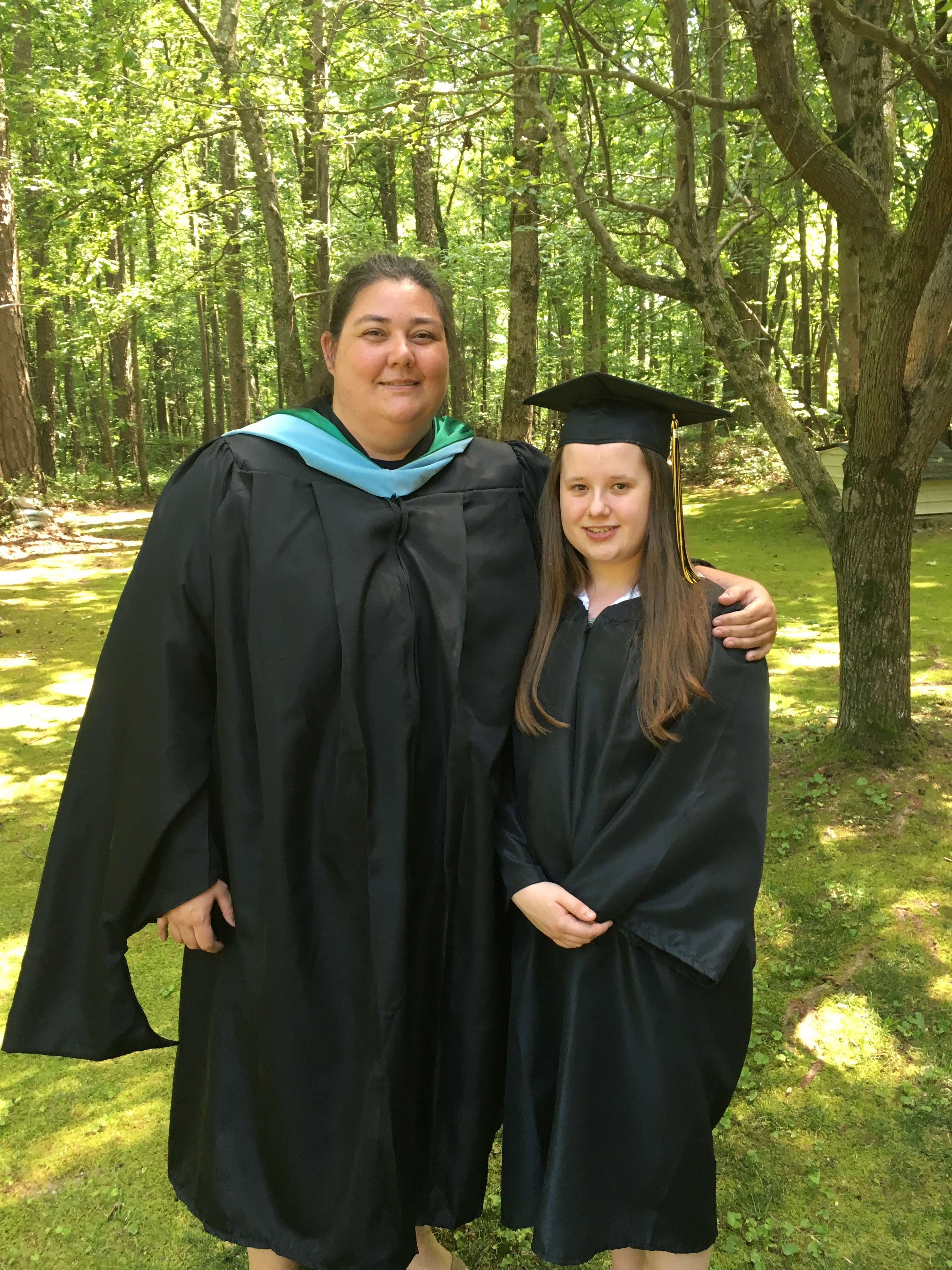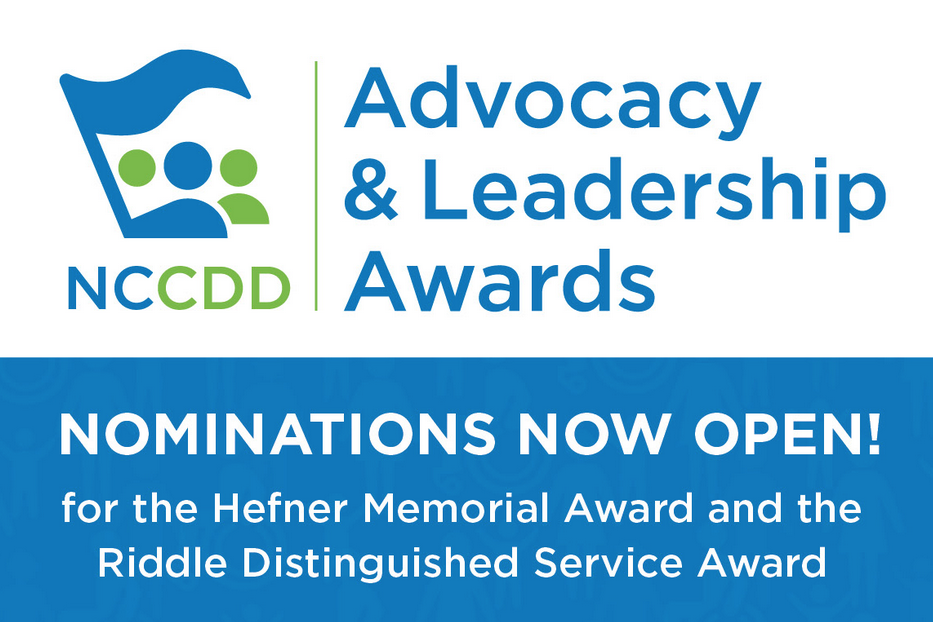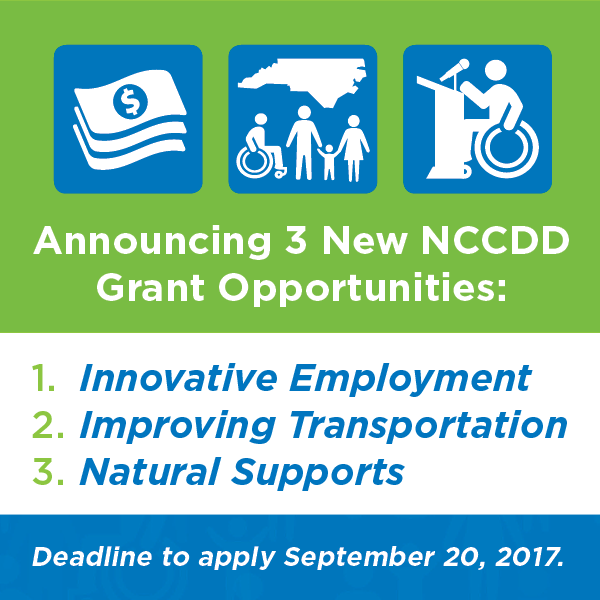August 2017: Highlights and Hot Topics

A Message from Our Executive Director
It sometimes takes a very conscious effort and a personal decision to gather the energy to think about future opportunities and the great possibilities that are ahead, especially during times of change. Yet, we know that with change comes opportunity!
During the August meeting of North Carolina Council on Developmental Disabilities (NCCDD), the members focused on what is possible. For the past six months, the Council has been prioritizing the areas of focus in which we will work to make positive change. During the meeting, the Council took the important step to authorize the release of three new requests for applications (RFAs) that will primarily impact two areas of our Five-Year Plan to increase financial security through asset development, and expand options for community living. We are excited and hopeful about the opportunities ahead.
Recently, Governor Roy Cooper appointed Alexandra “Alex” McArthur to be the newest chairperson for the Council, and we are very pleased and excited to have Alex in this important leadership position. You can read more about Alex, her background and her goals for the Council in this newsletter. We also have experienced more changes in the membership of the Council. We now have the opportunity to welcome talented new members appointed to represent the interests of people with intellectual and other developmental disabilities (I/DD) throughout the state of North Carolina.
The eight outstanding individuals appointed by Governor Cooper to NCCDD:
- Senator Valerie Foushee, Raleigh
- William Miller, Lexington
- Aldrea LaParr, Princeton
- Katherine Boeck, Tarboro
- Brendon Hildreth, New Bern
- Daniel Smith, Greensboro
- James Stephenson, Cary
- Nakima Clark, Raleigh
Watch future issues of “Highlights & Hot Topics” to learn more about each of our new Council members, their experiences and their plans to help implement our Five-Year Plan across the state. In other news from the meeting, we were honored to host North Carolina’s Department of Health and Human Services (NC DHHS) Deputy Secretary for Human Services, Susan Perry-Manning who gave us an update on the priorities of the department. She reminded Council members that there is “no better advocate than you.” More of her report is below.
In addition, the Council received a presentation on the opioid addiction plaguing North Carolina (and the nation) from Nidhi Sachdeva, Injury Prevention Consultant, Division of Public Health, NC DHHS. She shared the staggering statistics of opioid use and deaths impacting our state. You can read her report in this issue of “Highlights & Hot Topics.”
As always, we love hearing from the community about your thoughts, events and even your ideas on what can make your community a more inclusive place to for people with I/DD to live, work and play. Contact us here.
Chris Egan
Executive Director
State Update
The North Carolina General Assembly will be in back in session this week to address redistricting. While the session is not officially adjourned, there is an approved budget and several passed bills that affect people with I/DD.
Highlights of the budget include:
- Children with Disabilities - $6,319,908 recurring to support an increase in funding cap from 12.5% to 12.75% for children with disabilities in school systems.
- Children’s Development Services Agency (CDSA) - $690,594 recurring to address staffing needs in 2 CDSAs
- Single Stream Reductions to LME/MCOs were reallocated to several areas including:
- DD Innovations Waiver Slots – 400 slots – beginning January 1, 2018
- Disability Rights NC Settlement – $6.2 million – to address needs of children with I/DD and behavioral health needs
- Group Home Funding – $5 million – to address individuals who lost Personal Care Services due to changes in state plan
- Personal Care Services Rate Increase
A Special Provision which impacts individuals with I/DD requires that the previously required Strategic Plan for Improvement of Behavioral Health Services (due January 2018) include issues related to I/DD, including:
- Addressing waitlist for Innovations Waiver
- Single stream funding
- Home and Community Based Services (HCBS) and other federal mandates
- Autism services
Bills that impact individuals with I/DD:
H478 – Required Experience for MH/DD/SAS Qualified Professionals (QPs) – amends qualifications for QPs to count all years of full-time experience regardless of when the experience was obtained. This will not be in effect immediately as it requires changes in the state plan.
H630 – Rylan’s Law/Family/Child Protection and Accountability Act – reforms the state child welfare system; creates regional supervision and collaboration. There are many children with I/DD in the child welfare system.
H403 – Behavioral Health and Medicaid Modifications – this bill was not agreed upon before adjournment and can come up again. It contains modifications to LME/MCOs and Medicaid program.
In addition to legislative activity, the Department of Health and Human Services (DHHS) released a proposed program design for Medicaid managed care in NC. This proposal includes:
- Integrating services for physical health, behavioral health, intellectual and developmental disabilities, and substance use disorders;
- Addressing unmet social needs and their effect on overall health; and
- Building on and strengthening what is working well today, such as care management, while supporting providers and beneficiaries through any changes during the transition and beyond.
The proposed design includes moving to Prepaid Health Plan Regions that will manage Medicaid plans which include physical health, behavioral health, and long-term supports and services. Many people with I/DD would be a part of a “Tailored Plan” as opposed to the “Standard Plan.” I/DD Health Homes are suggested as a part of the “Tailored Plan.” The plan can be found at ncdhhs.gov/nc-medicaid-transformation. Comments are being accepted until September 8.
The Council will hold a policy call on Thursday, August 31 at 3:00 p.m. to discuss this further and will be submitting comments.
Federal policy
Health care and long-term services and supports
Before leaving for August recess, the Senate failed to pass a bill to repeal the Affordable Care Act (ACA) and fundamentally alter the Medicaid program.The House passed its version, the American Health Care Act, in early May by a very small margin. Repealing the Affordable Care Act and cutting and capping the Medicaid program would have significant ramifications for individuals with disabilities and other health conditions, including jeopardizing scarce funding for long-term services and supports which support individuals with significant disabilities to live in the community.
Bipartisan leadership in the Senate’s Health Education Labor and Pension (HELP) Committee has signaled an interest in a short-term bill to stabilize what’s known as a the “individual market,” where individuals and families can purchase insurance if they do not receive a benefit through their employer or other insurance programs.
Budget and Appropriations
House and Senate leadership will be focused on fiscal issues when they return, including finalizing their budget resolutions for fiscal year 2018 which begins in October. While budget resolutions typically are simply a way to highlight priorities and don’t have the force of law, it is an opportunity to include rules which can alter how fiscal legislation is passed, particularly in the Senate.
The House finalized it budget prior to summer recess, but a vote hasn’t taken place yet. Documents prepared by the House propose cutting “mandatory programs,” another term for programs like Medicaid, Medicare, Social Security and and Supplemental Security Income. This budget proposal also suggests using “reconciliation instructions,” which apply to bills focused on revenue or spending. These rules allow the Senate to reduce debate, allow qualifying money-related legislation to pass with only 51 votes, and prohibits the use of the filibuster. (Reconciliation instructions have been discussed a lot in the news recently -- this procedural rule was in place when the Senate failed to pass their health care bill at the end of July by 1 Senate vote.) NCCDD is pleased to see the House’s support for level funding of DD Councils across the nation.
Federal government programs are funded through September 30, the end of the 2017 fiscal year. If Congress cannot pass individual spending bills, they will need to pass a Continuing Resolution, a short-term funding bill to keep the government funded.
Deputy Secretary Susan Perry-Manning Speaks to the Council NC DHHS Deputy Secretary Susan Perry Manning meets with NCCDD Council members.At the August meeting of NCCDD, Susan Perry-Manning, North Carolina’s Department of Health and Human Services (NC DHHS) Deputy Secretary, listed three departmental priorities for our State:
NC DHHS Deputy Secretary Susan Perry Manning meets with NCCDD Council members.At the August meeting of NCCDD, Susan Perry-Manning, North Carolina’s Department of Health and Human Services (NC DHHS) Deputy Secretary, listed three departmental priorities for our State:
- Increasing efforts on Medicaid transformation
- Creating an early childhood action plan to strengthen services
- Addressing the state’s opioid crisis.
Perry-Manning reminded the Council that DHHS holds strong values to be customer focused in order to serve the people of North Carolina optimally, as well as maintaining transparency and engagement with all stakeholders. She said her hopes for the Council are for all to be bold and to think boldly of possibilities. She added a reminder that Goal 3 of the Council’s Five-Year Plan was advocacy and that there are no better advocates than those serving on the Council.
"Good policy happens when people who take time to inform decision makers about issues that they care about and what impacts them," said Perry-Manning. "Celebrate the successes, and let's work collaboratively."
NC DHHS Addresses Opioid Crisis with the Council
 Nidhi Sachdeva, injury prevention consultant, Division of Public Health, NC DHHS, addressed the Council regarding the current opioid crisis in North Carolina. She listed statistics about the drug crisis, including:
Nidhi Sachdeva, injury prevention consultant, Division of Public Health, NC DHHS, addressed the Council regarding the current opioid crisis in North Carolina. She listed statistics about the drug crisis, including:
- In 2010, drug overdose became the leading cause of injury in the United States, beating out motor vehicle injuries.
- There has been a 350% increase in deaths from drug overdoses since 1989.
- An 884% increase, since 1984, has occurred in heroin deaths.
“North Carolina leads in opioid overdose work. We were the first state to sound the alarm,” explained Sachdeva.
Addressing how it relates to the I/DD community, Chris Egan, NCCDD’s executive director, added, “In our adult care home transition project, we’ve seen some people prescribed as many as 20 different medications, which could possibly lead to addiction depending on the type of medication and coordination of healthcare.”
Sachdeva says the opioid epidemic seemed to come out of nowhere but points to things like pain becoming the fifth vital sign in 1989 and a 25-year growth of prescribing opioids at higher and higher doses as possible reasons for the epidemic. She added there are two sides to this epidemic: the public health side and the mental health side.
The Division’s action plan includes:
- Reducing the oversupply of prescription drugs and the flow of illicit drugs.
- Increasing communication awareness and prevention.
- Making Naloxone, which blocks or reverses the effects of opioids, widely available.
- Expanding treatment and recovery-oriented systems of care.
- Measuring the plan’s impact and reviewing strategies based on results.
Other sources available that could impact this epidemic include:
- Drug Take Back efforts via “Safe Kids” which provides a drop off drug box in every county to dispose of leftover medications.
- The NC Syringe Exchange, which has been in place since 2016 and now has 21 programs across the State.
- Utilizing the North Carolina Prescription Drug Abuse Advisory Committee to its fullest.
To learn more about NC Opiod Crisis and Action plan, visit www.ncdhhs.gov/opioids
Seeing Individuals’ Skill Sets, Not Labels

Fortunately, Bridges had Meghan LeFevers as her eighth grade math teacher at WC Friday Middle School in Dallas, North Carolina. Despite Bridges' diagnoses and difficulty learning, LeFevers saw a different side to her student.
“Most people saw her as the girl with autism who liked earrings and could not talk,” LeFevers observed. “I saw her as a mathematical genius, funny, sneaky eighth grader much like her peers. In my class, we educated one another about our unique needs, and she taught the class sign language for five minutes each day.”
LeFevers is now the assistant principal at Bessemer City High School. She reflected on the development of her teaching philosophy and noted that her career has always involved students who were at risk because of factors such as disability or poverty. “In quickly studying these students, I found they were often misunderstood or mislabeled. Furthermore, I saw most adults responding to these students based on their labels, not on their skill set.”
Additionally, her exposure as a child to other cultures through volunteer opportunities such as transporting families to the Shriners Hospital for appointments shaped her philosophy today. “Through those experiences, I was able to see my students with unique learning needs, not for their outward label, but for their inward gifts," she added.
LeFevers not only taught Bridges math, but she invited her to join the basketball team upon noticing that Bridges enjoyed basketball during Physical Education (PE). LeFevers commented, “This was crucial in our relationship because [Aubrey] saw this as a chance to be socially included as well.” At the conclusion of the school year, LeFevers began her North Carolina Principal Fellows Program at UNC-Charlotte, but she continued to work with Bridges as Community Alternatives Program (CAP) staff. This helped her develop personal care and in-home and community skills.
“I learned to be friends and have confidence,” Bridges proudly noted. She graduated with a high school diploma in 2016 and then headed to Winthrop in South Carolina.
This summer, Bridges worked at the Lowell Branch of the Gaston County Library and is preparing for her sophomore year at Winthrop. She takes regular courses such as biology, math, and computer science, making A’s and B’s and uses her phone and iPad to order food and chat with friends.
Bridges wants other people with I/DD “to know that they can work hard and have success too.” Showcasing their relationship and success, Bridges and LeFevers are busy presenting their story across the State at events such as the Division of Career Development and Transition Conference in Greensboro and as far away as the Council for Exceptional Children Conference in Boston. In their “I See You: Creating a Person Centered Environment” presentation, they discuss students with autism as people to be understood rather than problems to be solved.
LeFevers reflected that, “The most important aspect of my time with Aubrey was the fact that I never felt sorry for her. Rather I assisted her in sharing her awesomeness with the class and now the world!”
 Alexandra "Alex" McArthur, NCCDD's new chair. NCCDD Welcomes New Chair
Alexandra "Alex" McArthur, NCCDD's new chair. NCCDD Welcomes New Chair
Governor Roy Cooper appointed Alexandra “Alex” Cline McArthur as the new chairperson of the North Carolina Council on Developmental Disabilities (NCCDD). McArthur will begin her tenure at the Council’s quarterly meeting on August 10 in Cary, NC.
McArthur is employed as a Consultant in Advisory Services for the Taproot Foundation, an organization that drives social change by leading, mobilizing and engaging professionals in pro bono service. She was formerly the national director of Young Adult and Community Engagement for the Muscular Dystrophy Association (MDA). A North Carolina native, McArthur graduated from Davidson College, in Davidson, NC where she majored in History and also studied Spanish and Communications.
“It is an honor to have been appointed by Governor Cooper to chair such an impactful organization as the North Carolina Council on Developmental Disabilities. Their mission to assure that people with intellectual and developmental disabilities have access to services and equal opportunity in North Carolina aligns closely with my values and passions. I strongly believe that, together, we will do amazing things to achieve the goals of the Council’s Five-year Plan,” McArthur said.
McArthur’s advocacy efforts include promoting national workplace inclusion as Ms. Wheelchair America 2011. Her work for inclusion and opportunity for people with disabilities led McArthur to serve as the inaugural co-chair of the Junior Board for IncludeNYC and become a founding member of DiversAbility, a global movement to re-brand disability.
In 2014, she was chosen as a White House Champion of Change. She also serves as the chairperson of the Board of Directors of the National Disability Institute, an organization that drives social impact to build a better economic future for people with disabilities and their families.
UNC-CIDD Hosts Community Talk Series
 Meet advocates with disabilities working in the field of disability rights who will share what it means to live a full life as an adult with a disability and how to learn from the panel's experiences to support the next generation's success.
Meet advocates with disabilities working in the field of disability rights who will share what it means to live a full life as an adult with a disability and how to learn from the panel's experiences to support the next generation's success.
When: Wednesday, September 13, 2017
Where: Carolina Institute for Developmental Disabilities, Castelloe Conference Room 101, 101 Renee Lynne Court, Carrboro, NC 27510
Time: 6:30 PM
RSVP: Call or email Debbie Reinhartsen, PhD at 919-966-4138 or [email protected]
Nominations open for Advocacy and Leadership Awards
The North Carolina Council on Developmental Disabilities (NCCDD) honors the significant contributions made by advocates who are actively working to change attitudes and support greater choices for a more inclusive North Carolina. NCCDD is now accepting nominations for its advocacy and leadership awards that will be presented during the annual meeting in November.
Learn more about the awards below and submit nominations by Sept. 18, 2017:
Jack B. Hefner Memorial Award: A former member of NCCDD, Jack Hefner's leadership inspired a generation of advocates and people with I/DD. This award recognizes self-advocates or family members who are working to build a better NC for people with intellectual and/or other developmental disabilities.
Helen C. "Holly" Riddle Distinguished Service Award: Holly Riddle was the executive director of NCCDD for 23 years. For her dedicated service, NCCDD established this award to recognize those professionals who have made lasting contributions towards improving opportunities, breaking down barriers and promoting increased quality of life for people with intellectual and/or other developmental disabilities.
Nominate deserving individuals for either the Jack B. Hefner Memorial Award or Helen C. "Holly" Riddle Distinguished Service Award by clicking or by copying and pasting the following link: http://tinyurl.com/AdvocacyLeadership
 For the past six months, NCCDD has been prioritizing the areas in which we will work to make positive change. The Council has released three new requests for applications (RFAs) that will primarily impact two areas of the Five-Year Plan to increase financial security through asset development, and expand options for community living.
For the past six months, NCCDD has been prioritizing the areas in which we will work to make positive change. The Council has released three new requests for applications (RFAs) that will primarily impact two areas of the Five-Year Plan to increase financial security through asset development, and expand options for community living.
The RFA's include:
- Innovative Employment: Making Inroads to Long-Term Success through Apprenticeships, Pre-Transition Partnerships, and Post-Secondary Mentoring
- I Get Around: Improving Transportation Options
- Using Natural Supports to Build Greater Community Engagement
Learn more about the RFAs and how to apply here.